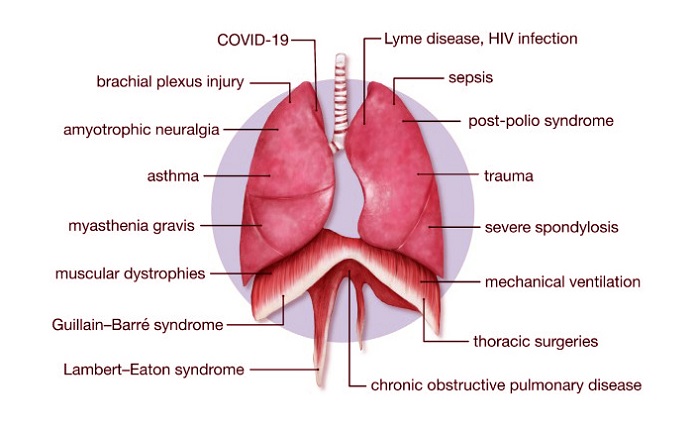Nikhil Prasad Fact checked by:Thailand Medical News Team Oct 30, 2024 1 year, 3 months, 6 days, 10 hours, 57 minutes ago
Medical News: Bialystok Researchers Reveal Respiratory Implications of Long COVID
A recent study by researchers from the Medical University of Bialystok in Poland uncovers that COVID-19 may result in significant diaphragmatic dysfunction, affecting breathing and overall health. The team, composed of Dr. Katarzyna Anna Pietranis, Dr. Amanda Maria Kostro, Dr. Zofia Dzięcioł-Anikiej, Dr. Diana Moskal-Jasińska, and Dr. Anna Kuryliszyn-Moskal, explored how COVID-19 impacts the diaphragm muscle, potentially leading to long-lasting respiratory and muscular complications.
 The main causes of diaphragm, vagus nerve, and lung dysfunction.
The main causes of diaphragm, vagus nerve, and lung dysfunction.
This
Medical News report examines how COVID-19’s effects extend beyond the lungs, exploring its impact on the diaphragm - a crucial muscle in breathing, balance, and even neurological regulation. The study highlights that patients recovering from COVID-19, especially those who required mechanical ventilation, may suffer from diaphragm-related issues even after apparent recovery, which could explain persisting symptoms like breathlessness and fatigue.
Thailand
Medical News had previously covered various studies that also showed COVID-19 was able to affect the diaphragm and cause breathing issues through a number of direct and indirect mechanisms.
https://www.thailandmedical.news/news/diaphragm-muscle-atrophy-linked-to-long-term-fatigue-in-covid-19-survivors
https://www.thailandmedical.news/news/covid-19-news-post-covid-respiratory-muscle-weakness-and-reduced-exercise-capacity-is-associated-with-reduced-phrenic-nerve-cmap
https://www.thailandmedical.news/news/covid-19-news-study-shows-that-sars-cov-2-infections-can-cause-acute-phrenic-neuropathy-and-diaphragmatic-dysfunction
https://www.thailandmedical.news/news/even-asymptomatic-and-mild-covid-19-causes-neuromuscular-damage-to-the-diaphragm-resulting-in-the-long-covid-manifestations-of-fatigue-and-dyspnea
The Role of the Diaphragm in Health and Disease
The diaphragm is the body’s primary breathing muscle, essential not only for respiratory function but also for maintaining
balance, posture, and coordination. Dr. Pietranis and her team found that COVID-19’s influence on this muscle may significantly alter these functions, potentially leading to complications in various systems of the body. The study describes how the diaphragm, located below the lungs, contracts and expands with each breath, creating the negative pressure needed for inhalation.
Moreover, the diaphragm is linked to several bodily systems, such as the autonomic nervous system, which regulates involuntary processes like heart rate and digestion. The researchers noted that by influencing the diaphragm, COVID-19 could indirectly impact these systems, compounding the long-term effects observed in many COVID-19 survivors.
COVID-19 and Diaphragm Dysfunction: What the Study Found
The Polish study identified several pathways through which COVID-19 damages the diaphragm:
-Neurological Impact: COVID-19’s neuroinvasive nature means it can affect the nerves controlling the diaphragm. By attaching to ACE2 receptors, which are present in nerve cells, the virus can lead to inflammation and damage, potentially causing diaphragmatic palsy, a condition where the diaphragm is weakened or paralyzed.
-Inflammatory Response: COVID-19 is known for causing “cytokine storms,” where the immune system releases excessive cytokines, leading to widespread inflammation. This reaction can damage muscle tissues, including the diaphragm. The study found that inflammatory markers like IL-6 and TNF-α were associated with muscle damage in COVID-19 patients, contributing to long-term dysfunction.
-Muscle Atrophy and Fatigue: For patients bedridden due to severe COVID-19, muscle atrophy becomes a concern. Prolonged inactivity weakens the diaphragm, which, coupled with viral inflammation, leads to long-term respiratory weakness. The study emphasized that this atrophy, combined with nerve damage, contributes to difficulty breathing and fatigue, even after the virus has cleared.
Long COVID and Persistent Diaphragmatic Issues
Diaphragm dysfunction is particularly concerning in the context of long COVID. Many patients report lingering symptoms such as breathlessness, poor posture, and even balance issues. The researchers suggest that these symptoms may arise due to persistent diaphragm weakness, which in turn affects respiratory capacity and balance.
Another striking finding is the link between diaphragm dysfunction and “brain fog,” a symptom reported by many long COVID patients. The team hypothesizes that improper breathing patterns due to a weakened diaphragm can influence oxygen levels and impact cognitive functions, including memory and concentration.
Diagnosis and Treatment Options
Diagnosing diaphragm dysfunction is challenging, as standard lung tests often fail to capture the intricacies of diaphragm strength. The study advocates for advanced diagnostic techniques, such as ultrasound imaging and transdiaphragmatic pressure measurements, which can more accurately assess diaphragm function in post-COVID patients.
The researchers recommend rehabilitation programs focusing on diaphragmatic breathing exercises to improve respiratory muscle strength. Additionally, some patients may benefit from non-invasive ventilation support and physical therapy to restore muscle function and improve overall breathing capacity.
Conclusions and Future Implications
The Polish study underscores that COVID-19 can have long-term effects on the diaphragm, potentially causing lasting complications in respiratory and muscular health. As the researchers emphasize, understanding the role of the diaphragm in post-COVID symptoms opens new avenues for targeted rehabilitation and treatment.
The findings reveal a crucial insight into why many COVID-19 survivors experience prolonged symptoms, particularly those related to breathing and fatigue. Long-term monitoring of diaphragm function, especially in severe COVID-19 cases, could be instrumental in managing post-COVID health.
The study findings were published in the peer-reviewed Journal of Clinical Medicine.
https://www.mdpi.com/2077-0383/13/21/6493
For the latest COVID-19 News, keep on logging to Thailand
Medical News.
Read Also:
https://www.thailandmedical.news/news/long-covid-patients-face-hidden-lung-problems-leading-to-persistent-breathlessness
https://www.thailandmedical.news/news/covid-19-is-not-mild-as-most-will-develop-lung-fibrosis-10-percent-of-all-lung-transplants-in-u-s-now-go-to-post-covid-patients
